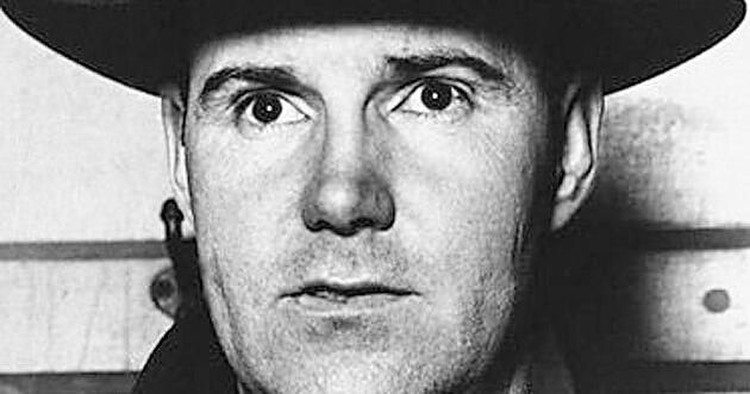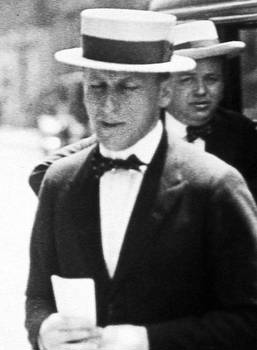Bill Caldwell: Titanic Thompson was 'the man who bet on everything'

For decades, legalized gambling was limited to the state of Nevada. But long before Nevada made it legal, sporting events provided opportunities for friendly wagers and side bets that could range from a few dollars to thousands.
One of the most famous hustlers was Alvin C. Thomas, known as Titanic Thompson. Titanic made millions gambling on cards, pool, horse racing and golf, as well as many spontaneous, unorthodox wagers.
Thomas was born to Lee and Sarah Thomas on Nov. 30, 1893, in Monett. His father, a gambler, abandoned the family shortly after Alvin was born. His mother remarried a Baptist farmer and moved to Arkansas. His stepfather taught him how to play cards and throw dice in between farm chores.
The young man had excellent eyesight, great hand-eye coordination and was a crack shot. He had little interest in other education, but he did see that games of chance such as penny tossing or pitching cards into a hat could make him money.
One of his early hustles was training his dog to fetch rocks thrown into a pond. He would wait until a fisherman came around, strike up a conversation and make a remark about how his dog could fetch a rock thrown into the pond. If the mark bit, he would make a bet. The man would always say, mark the rock before you throw it, which Thomas would plainly do. He would toss the rock into the pond and the dog would faithfully bring back a marked rock. He won any number of times. What the mark didn’t know, was the floor of the pond was littered with marked rocks.
When he left home at 16, he was functionally illiterate. His mother made him promise not to drink or smoke, a promise he kept. But hustling and scams became his life’s work. He learned how to mark cards with a sharpened little fingernail, to deal from the bottom of the deck and to calculate odds. He could palm almost any small object his hand could cover — coins, rocks, fruit and cards. He could shoot a pistol or a rifle with equal ease. One scam involved shooting a hole in a silver dollar. He would palm the intact dollar, throw up a doctored dollar, then shoot to miss. Marks were none the wiser.
Origin of nickname
Thomas worked his hustles in the Ozarks and upper South. In Arkansas in 1911, he killed his first man. He had won a riverboat from its owner. A friend of the former owner accused Thomas of cheating and threw him off the boat. When Thomas climbed back on board, he saw the accuser threatening his girlfriend with a knife. Thomas felled him with a hammer, killing him on the spot. Instead of a murder charge, the sheriff made an offer — stay and be charged, or give him the boat and leave. Thomas and his girlfriend left. After that, he never took any of his five future wives with him when he gambled.
The next year, just after the Titanic sank, he was in Joplin at a pool hall. Thomas had won about $500 hustling pool from Snow Clark and was leaving when he noticed a sign that bet $200 if anyone could jump across the newest table without touching it. Thomas went out, found an old mattress, tossed it on the floor, took a running leap and landed on the mattress free and clear. Said Thomas, “I could jump farther than a herd of bullfrogs in those days.” Someone asked, what’s that man’s name? Clark replied, “It must be Titanic, he sinks everybody.” The nickname stuck. Thompson was the result of a newspaper mistake that Thomas adopted, becoming Titanic Thompson.
During World War I, he was drafted. Basic training was a breeze. He became a sergeant, training draftees in boot camp and teaching poker on the side. By the time he mustered out, he bankrolled $50,000 in cash and bought a new house for his mother in Monett.
The 1920s and 1930s were the heyday for Titanic. Prohibition opened opportunities for liquor and gambling in big cities. He became a road gambler, playing games, not just cards, wherever the action was. He famously bet he could throw an item, walnut or orange, to the top of a four- or five-story building. In every case he would palm a doctored item weighted with lead shot instead, and throw it to the top. Once he bet he could throw a pumpkin to the top of the Connor Hotel. He had stashed a runt pumpkin filled with shot and heaved it to the roof.
He discovered golf in 1921 and fell in love. His physical abilities made golf “as easy as breathing.” He could play left- or right-handed, naturally left-handed. That led to hustles where he would barely lose playing right-handed and ask for a rematch, double or nothing, playing left-handed.
Why not turn pro? Lucky pro golfers then earned $3,000 a year. He took in that much a week from bets. He couldn’t afford the cut in pay, he was reported as having remarked.
He once bet a Chicago gambler he could drive a golf ball 500 yards. On a lake shore course in the dead of winter, he drove a ball down the fairway and out onto frozen Lake Michigan, long past the required distance.
Run-ins with the law
Three times he killed men who tried to rob him for his winnings at cards and dice. In St. Louis after the war, he and a hired bodyguard killed two gunmen the dealer had set up to take back his $40,000 in winnings. Instead of running, he reported to the police. The gunmen were wanted men. The police thanked him and sent him on his way.
A similar thing happened in St. Joseph, Missouri. He shot two robbers, killing one. Again, they were known criminals and Titanic was not charged.
The last was in 1932 when, after a day of golf and cards, he was accosted by a masked man. Titanic always carried a pearl-handled revolver in a specially made pocket of his suit. He dropped to one knee and shot the man twice. The masked man was his 16-year old caddy from earlier in the day who did robberies on the side.
From time to time, he partnered with other hustlers such as Minnesota Fats and Nick the Greek. In 1928, Nick the Greek got him into a high-stakes poker game in New York City with Arnold Rothstein, the fixer of the 1919 World Series Black Sox scandal. Rothstein was set up by Nick, Titanic, George McManus and others. He lost $475,000 to the other gamblers, $30,000 to Thompson alone. Rothstein handed out IOUs.
He was found in the hall of a hotel six weeks later dead with two gunshot wounds. The gamblers were all arrested, with McManus charged with murder.
Titanic turned state’s witness. When he was on the stand, the prosecutor asked his occupation. “I run a café.”
“You have other means of income, do you not?”
Titanic smiled and said, “I play a little golf for money.”
His memory was selective, however. He lauded McManus as a stand-up guy and a good loser, and he said that no one had any doubts about Rothstein’s IOUs because they were as good as gold. McManus had no need to kill him. McManus was acquitted.
Titanic Thompson’s exploits continued uninterrupted as he aged. He always looked for the next hustle, even when he lived in a nursing home in Tyler, Texas, in the 1970s.
Said his last wife, Jeanette, “Slim didn’t just like to gamble, he loved to gamble. He didn’t waste his time with anything that interfered with gambling, not food or sleep or love.
“And as much as he said he didn’t like the notoriety, he loved being Titanic Thompson.”
Bill Caldwell is the retired librarian at The Joplin Globe. If you have a question you’d like him to research, send an email to [email protected] or leave a message at 417-627-7261.



































